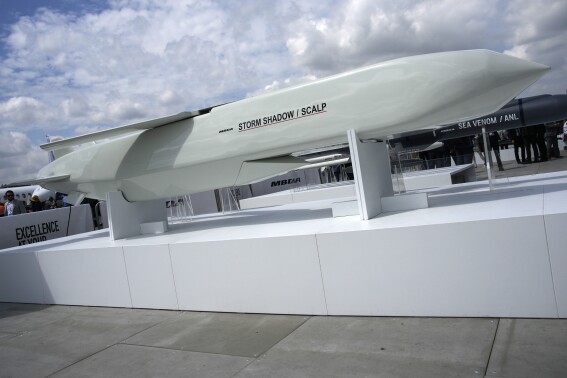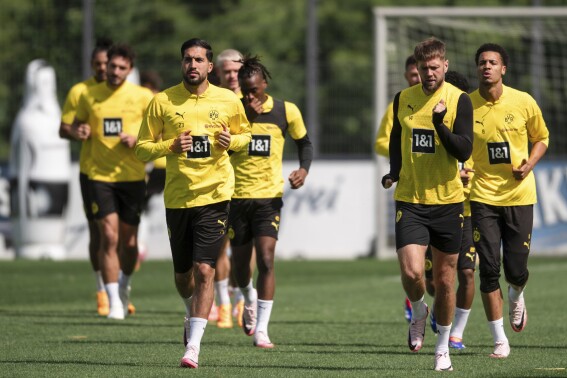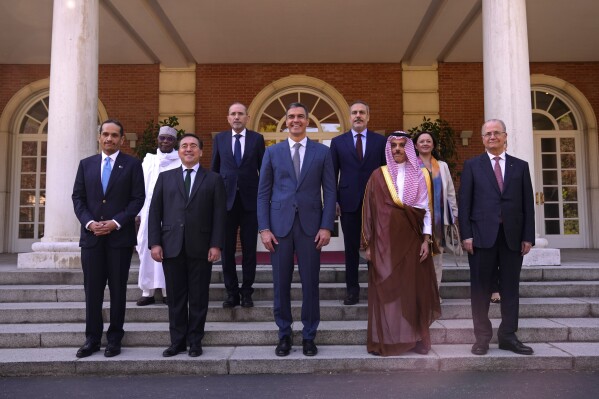Ukraine, NATO Allies Urge Joe Biden to Drop 'World War III' Red Line
Momentum is growing among NATO allies to allow Ukraine to fire Western weapons at military targets inside Russian borders, a step that the White House has staunchly opposed for fear of Moscow's war on its neighbor broadening into a direct clash with the Western allies.
Russia's new cross-border offensive into Ukraine's northeastern Kharkiv region has left Kyiv reeling, with defending forces unable to use advanced NATO arms to target the vital supply lines supporting the evolving attack.
Secretary of State Antony Blinken is reportedly among those pushing the president to loosen the restrictions on Ukraine that have for more than two years limited its use of Western weapons to within occupied Ukrainian territory. President Volodymyr Zelensky told The New York Times last week that the constraints have given Moscow a "huge advantage."
"We have weapons, but we cannot use them against Russia until they cross the border," Yehor Cherniev—a member of the Ukrainian parliament and the deputy head of its national security, defense and intelligence committee—told Newsweek.
"We had information before the latest Russian offensive near Kharkiv, about them assembling their troops, about their equipment, but we couldn't do anything," Cherniev added.
"We couldn't strike, and that's why we couldn't prevent this attack. That's why we lost some villages, some territories, and we lost our soldiers and civilians. This is ridiculous."
Waiting Game
Ukraine is gathering approval from other NATO states to use their provided arms against targets inside Russia. Nations including the U.K., Estonia, Latvia, Lithuania, Spain, Finland and Poland have expressed their backing for Kyiv to attack Russian targets wherever it chooses.
NATO Secretary-General Jens Stoltenberg said on Monday he believes "the time has come to consider some of these restrictions," and European Union foreign policy chief Josep Borrell has said that some European nations have already decided to lift restrictions. "Events are changing and people are changing," he said on Tuesday.
French President Emmanuel Macron—long at the forefront of NATO states pushing for more assertive action in Ukraine—also said on Tuesday that the alliance must allow Kyiv "to neutralize the military sites from which the missiles are fired, but not other civilian or military targets. We're not being escalatory by doing this."
Speaking alongside him, German Chancellor Scholz was characteristically cautious, saying any Ukrainian use of Western weapons "must always be within the framework of international law."
Biden has broadly opposed any perceived escalation in Ukraine, his administration pushing back on Ukrainian drone strikes inside Russia, flatly refusing permission for Ukraine to use American weapons inside Russian borders, and dismissing the possibility of NATO "boots on the ground" in Ukraine.
"We will not fight a war against Russia in Ukraine," the president said soon after Russia's invasion began in the spring of 2022. "A direct confrontation between NATO and Russia is World War III. And something we must strive to prevent."
But there are signs of discord within the administration. Blinken and his State Department are reportedly pushing for a loosening of weapons restrictions. Defense Secretary Lloyd Austin has hinted at a change in policy regarding shooting down Russian aircraft operating over Russian territory, saying this month that the "aerial dynamic's a little bit different."
While European support is building, Cherniev—who is also the permanent head of Ukraine's delegation to the NATO Parliamentary Assembly (PA)—said: "We understand that it's more important to have permission from the U.S."
"I know this is under discussion, but still we don't have a decision," he added. "I really hope that this decision will be made as soon as possible, and it will be a sign for other countries."
The NATO PA on Monday adopted a resolution urging allied capitals to lift "some restrictions on the use weapons provided by NATO Allies to strike legitimate targets in Russia."
Oleksandr Merezhko, a fellow member of parliament and the chair of the body's foreign affairs committee, told Newsweek he is "sure" that the U.S. decision has already been made. "Judging by the statement made by Blinken, the U.S. doesn't encourage Ukraine's strikes in the Russian territory, but, at the same time, is not going to ban such strikes."
Newsweek has contacted the White House and State Department by email to request comment.
The Kremlin has sought to leverage Western concerns over a deeper presence in Ukraine. "Constant escalation can lead to serious consequences," President Vladimir Putin told reporters on Tuesday. "If these serious consequences occur in Europe, how will the United States behave, bearing in mind our parity in the field of strategic weapons?"
Escalation Dominance
NATO allies are intensely debating how to deepen support for Ukraine and bolster Kyiv as it withers under Russia's multipronged offensive, twinned with continued missile and drone strikes nationwide.
Lifting weapon restrictions, deploying noncombat NATO troops in-country, and using allied air defenses in eastern flank nations to protect parts of Ukraine have all been proposed. Ukraine's commander-in-chief, Oleksandr Syrskyi, this week signed a decree granting French military instructors permission to use Ukrainian bases.
"We still don't have any decision about it from any country." Cherniev said of NATO boots on the ground. "We're open to any way Western troops can be involved in the defense of our territory."
Options touted include positioning NATO troops along the Ukrainian border with Belarus to forestall any reinvasion from the north, as well as in a similar protective role along the Russian-aligned Moldovan region of Transnistria on Ukraine's southwestern border.
"We're not talking about direct clashes with the Russians in Donbas or Kharkiv," Cherniev added.
The alliance's bid to seize back "escalation dominance" from Moscow comes amid faltering flows of Western aid to Ukraine and concerns that pivotal American presidential and European Parliament elections this year will further disrupt NATO backing for Kyiv.
As with all major Western interventions, the pace of the current discussions have at times felt glacial. All the while, Ukrainian troops are being forced to give up ground all along the front.
"Every time, we received what we asked for, but after six months, eight months, nine months, a year of persuasion," Cherniev said. "And it costs us our lives, the lives of our most experienced soldiers, combat-ready units, and our civilians."
"Wasting this time, we give Russia time for preparation, and it's becoming difficult to push them back from the occupied territories," he added. "We were losing our troops during these months when we were waiting for these different kinds of weapons. It's the same situation now."
Disclaimer: The copyright of this article belongs to the original author. Reposting this article is solely for the purpose of information dissemination and does not constitute any investment advice. If there is any infringement, please contact us immediately. We will make corrections or deletions as necessary. Thank you.


